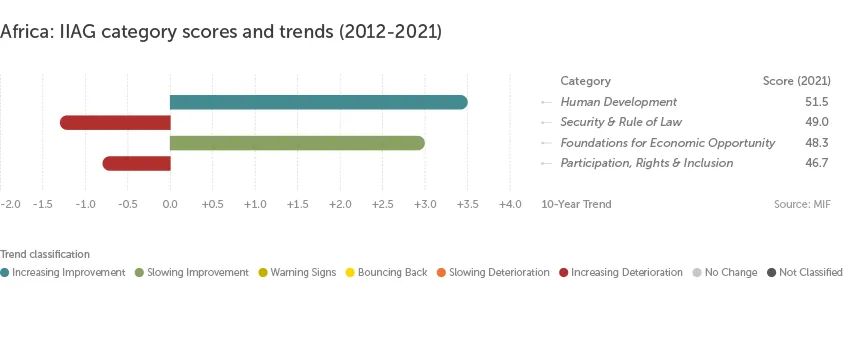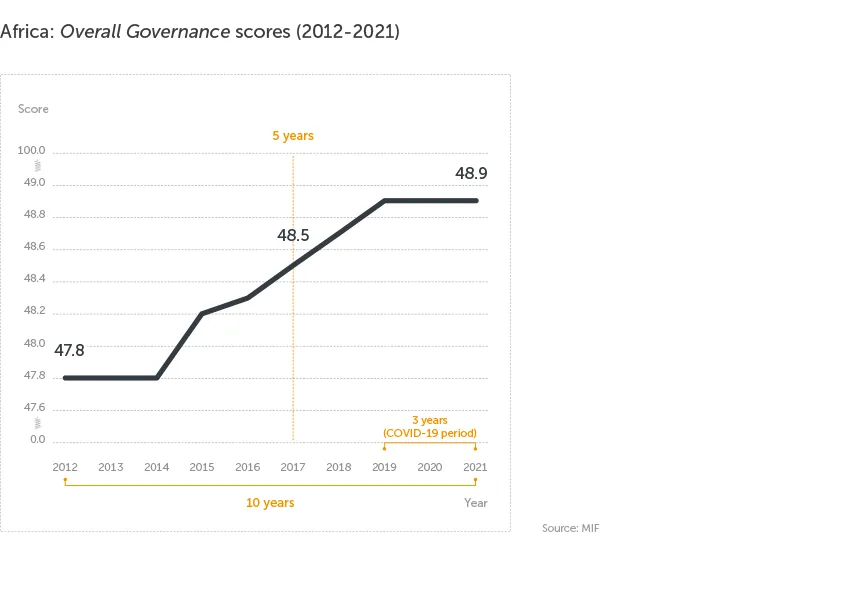Overall Governance: A decade of progress under threat due to diverging trends and COVID-19 impact
14 February, 2023
The 2022 Ibrahim Index of African Governance (IIAG) shows that the African average score for Overall Governance has improved by +1.1 score points over the decade (2012-2021). More than half of Africa’s population live in a country where governance has improved between 2012 and 2021, primarily because of progress in two IIAG categories – Human Development (+3.5) and Foundations for Economic Opportunity (+3.0).
For more than half of Africa’s population (53.3%), Overall Governance has improved between 2012 and 2021
Public services such as health and education are better now than in 2012. Social protections are more extensive, decent housing is on the rise, and governments have made strides in environmental sustainability. More people in Africa have access to digital devices and banking services now than ever. Governments have increased their statistical capacity and civil registration systems are timelier and more accessible.
On the other hand, two other IIAG categories have experienced a deterioration since 2012 – Security & Rule of Law (-1.3) and Participation, Rights & Inclusion (-0.8). Crucially, the state of growing insecurity and democratic backsliding is a cause for concern. Almost 70% of Africa’s population live in a country where the security situation is worse now than in 2012. Levels of violence against civilians and armed conflicts are much higher than in 2012. Many governments have been increasingly willing to infringe on rights, curb freedom of expression, and impose restrictions on civic space.
There have been diverging IIAG category trends since 2012: while Foundations for Economic Opportunity and Human Development have improved, Security & Rule of Law and Participation, Rights & Inclusion have deteriorated

Even though governance progress has also taken place over the five-year period (2017-2021), albeit at a slower pace, the latest three years tell us a different story. Between 2019 and 2021, COVID-19 has exacerbated concerning pre-existing trends and, as a result, Africa’s Overall Governance score has flatlined (at 48.9 out of 100.0). The pandemic impact has worsened the security situation even further, as well as accelerated the erosion of democracy on the continent – with the declines in the IIAG categories Security & Rule of Law and Participation, Rights & Inclusion accelerating since 2019.
Progress has also halted in IIAG sub-categories such as Education and Sustainable Environment since 2019. It is important to note, however, that progress in Foundations for Economic Opportunity has taken place at a faster pace between 2019 and 2021. Despite the seismic impact of COVID-19 on Africa’s economies, this is the only IIAG category to improve performance since 2019.
Despite showing improvement over the decade, Overall Governance has stalled since 2019

The continent’s worsening security situation and democratic backsliding are all the more concerning given the combined impacts of global, non-African born challenges such as the COVID-19 pandemic and the climate crisis. This is now exacerbated by the ongoing Russia-Ukraine war, which started on 24 February 2022, and its particularly harsh indirect impact on Africa.
Considering these cumulative crises to which Africa is uniquely exposed, the 2022 IIAG can be taken as a warning that unless sustained good governance is prioritised, Africa’s progress and ability to achieve the global Sustainable Development Goals (SDGs) and the African Union’s (AU) Agenda 2063 in due time is under threat.
To achieve meaningful and sustainable progress, there can be no trade-offs between the different components of governance
With 2023 being the halfway point to meeting the global SDGs, action is urgently needed to address the democratic backsliding and growing insecurity. The focus must be on improving all areas of governance to achieve meaningful and sustainable progress. There can be no trade-offs between the different components of governance.


